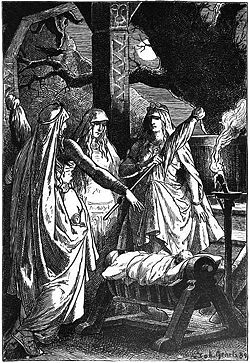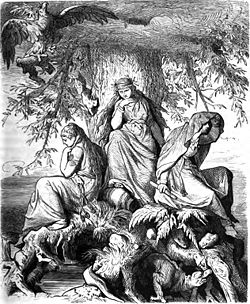Norns
This article may need to be rewritten to comply with Wikipedia's quality standards. (March 2015) |


The Norns (
Etymology
The origin of the name norn is uncertain; it may derive from a word meaning 'to twine', which would refer to their twining the thread of fate.[3] Bek-Pedersen suggests that the word norn has relation to the Swedish dialect word norna (nyrna), a verb that means 'communicate secretly'. This interpretation relates to the perception of norns as shadowy, background figures who only really ever reveal their fateful secrets to people as their fates come to pass.[4]
The name
Relation to other Germanic female deities

There is no clear distinction between norns,
- Woman is also metaphorically called by the names of the Valkyrs or Norns or women of supernatural kind.[10]
Attestations
There are a number of surviving Old Norse sources that relate to the norns. The most important sources are the Prose Edda and the Poetic Edda. The latter contains pagan poetry where the Norns are frequently referred to, while the former contains pagan poetry as well as retellings, descriptions and commentaries by the 12th and 13th century Icelandic chieftain and scholar Snorri Sturluson.
Skaldic poetry
A skaldic reference to the norns appears in Hvini's poem in
|
|
Poetic Edda
The
|
|
It appears from Völuspá and Vafþrúðnismál that the three main norns were not originally goddesses but giants (Jotuns), and that their arrival ended the early days of bliss for the gods, but that they come for the good of humankind.
Völuspá relates that three giants of huge might are reported to have arrived to the gods from

Arthur Rackham
|
|
Vafþrúðnismál probably refers to the norns when it talks of maiden giants who arrive to protect the people of Earth as protective spirits (hamingjas):[3][19]
|
The Völuspá contains the names of the three main Norns referring to them as maidens like Vafþrúðnismál probably does:
|
|
Helgakviða Hundingsbana I

Arthur Rackham

The norns visited each newly born child to allot his or her future, and in Helgakviða Hundingsbana I, the hero Helgi Hundingsbane has just been born and norns arrive at the homestead:
|
|
Helgakviða Hundingsbana II
In Helgakviða Hundingsbana II, Helgi Hundingsbane blames the norns for the fact that he had to kill Sigrún's father Högni and brother Bragi in order to wed her:
|

Arthur Rackham
Reginsmál
As Snorri Sturluson stated in Gylfaginning, one's fate depended on the Norn's good or bad will. In Reginsmál, the water dwelling dwarf Andvari blames his plight on an evil norn, presumably one of the daughters of Dvalin:
|
|
Sigurðarkviða hin skamma
Another account blaming the Norns for misfortune occurrs in
|
Guðrúnarkviða II
In
|
|
Guðrúnarhvöt
In Guðrúnarhvöt, after having killed both her husband and son, Guðrún blames the Norns themselves for her misfortune. In this excerpt Guðrún talks of trying to escaping the wrath of the Norns by making an attempt on her own life, attempting to escape the fate they had woven for her:
|
|
Hamðismál

Guðrúnarhvöt deals with how Guðrún incited her sons to avenge the cruel death of their sister Svanhild. In Hamðismál, her sons' expedition to the Gothic King Ermanaric to exact vengeance. Knowing that he is about to die at the hands of the Goths, her son Sörli talks of the cruelty of the norns:
|
|
Sigrdrífumál

C. E. Brock
The Norns were known as beings of ultimate power who worked in the dark and were often referred to in charms, as they are by
|
Prose Edda
In the part of Snorri Sturluson's
- A hall stands there, fair, under the dwarves, as it is said here:
- A hall stands there, fair, under the
- Most sundered in birth
- I say the Norns are;
- They claim no common kin:
- Some are of Æsir-kin,
- some are of Elf-kind,
- Some are Dvalinn's daughters.
- Then said Gangleri: "If the Norns determine the weirds of men, then they apportion exceeding unevenly, seeing that some have a pleasant and luxurious life, but others have little worldly goods or fame; some have long life, others short." Hárr said: "Good norns and of honorable race appoint good life; but those men that suffer evil fortunes are governed by evil norns."[40]
The three main norns take water out of the well of Urd and water Yggdrasil:
- It is further said that these Norns who dwell by the Well of Urdr take water of the well every day, and with it that clay which lies about the well, and sprinkle it over the Ash, to the end that its limbs shall not wither nor rot; for that water is so holy that all things which come there into the well become as white as the film which lies within the egg-shell,--as is here said:
- I know an Ash standing
- called Yggdrasill,
- A high tree sprinkled
- with snow-white clay;
- Thence come the dews
- in the dale that fall--
- It stands ever green
- above Urdr's Well.
- That dew which falls from it onto the earth is called by men honey-dew, and thereon are bees nourished. Two fowls are fed in Urdr's Well: they are called Swans, and from those fowls has come the race of birds which is so called."[40]
- It is further said that these Norns who dwell by the Well of Urdr take water of the well every day, and with it that clay which lies about the well, and sprinkle it over the Ash, to the end that its limbs shall not wither nor rot; for that water is so holy that all things which come there into the well become as white as the film which lies within the egg-shell,--as is here said:

Snorri Sturluson furthermore informs the reader that the Norn of present, Skuld, is also a valkyrie, taking part in the selection of warriors from the slain:
Legendary sagas
Some of the
|
|
In younger legendary sagas, such as
One of the last legendary sagas to be written down, the Hrólfs saga kraka references the Norns as evil witches. When the malevolent half-elven princess Skuld assembles her army to attack Hrólfr Kraki, it contains in addition to undead warriors, elves and Norns.
Runic inscription N 351 M
- Þórir carved these runes on the eve of Olaus-mass, when he travelled past here. The norns did both good and evil, great toil ... they created for me.[43]
See also
- Deities and fairies of fate in Slavic mythology
- Hecate
- Matrones
- Moirai, Fates in Greek religion and mythology
- Parcae, Fates in Roman religion and mythology
- Valkyries
- Weird Sisters, witches in Shakespeare's Macbeth
Citations
- ^ Nordisk familjebok (1907)
- ^ "Components of The Dinner Party". Brooklyn Museum. Retrieved 2025-04-04.
- ^ a b c d e The article Nornor in Nordisk familjebok (1913).
- ISBN 978-1-906716-18-9.
- ISBN 978-1-906716-18-9.
- ^ a b "Swedish Etymological dictionary". Runeberg.org. Retrieved 2012-12-30.
- ^ "wyrd - Wiktionary". 7 January 2022.
- ^ "Etymonline.com". Etymonline.com. Retrieved 2012-12-30.
- ^ Bek-Pedersen, Karen. 2011. The Norns: Representatives of Fate in Old Norse Tradition. In: Monaghan, Patricia. Goddesses in World Culture. V.2 P.271.
- ^ Skáldskaparmál in translation by Arthur Gilchrist Brodeur (1916), at Google Books.
- ^ ISBN 978-1-906716-18-9.
- ISBN 978-1-906716-18-9.
- ISBN 978-1-906716-18-9.
- ^ "See commentary by Bellows". Sacred-texts.com. Retrieved 2012-12-30.
- ^ Fáfnismál Guðni Jónsson's edition of the text with normalized spelling.
- ^ Fafnismol in translation by Henry Adams Bellows (1936), at Sacred Texts.
- ^ a b Völuspá Guðni Jónsson's edition of the text with normalized spelling.
- ^ Völuspá in translation by Henry Adams Bellows (1936), at Sacred Texts.
- ^ "See also Bellows' commentary". Sacred-texts.com. Retrieved 2012-12-30.
- ^ Vafþrúðnismál Guðni Jónsson's edition of the text with normalized spelling.
- ^ The lay of Vafthrúdnir in translation by Benjamin Thorpe (1866), at Google Books.
- ^ Lays of the gods in translation by Henry Adams Bellows (1936), at Sacred Texts.
- ^ Helgakviða Hundingsbana I Guðni Jónsson's edition of the text with normalized spelling.
- ^ The First Lay of Helgi Hundingsbane in translation by Henry Adams Bellows (1936), at Sacred Texts.
- ^ Völsungakviða in forna Archived 2007-05-08 at the National and University Library of Iceland Guðni Jónsson's edition of the text with normalized spelling.
- ^ a b Typographical error for Norns, cf. the text in Old Norse.
- ^ The Second Lay of Helgi Hundingsbane in translation by Henry Adams Bellows (1936), at Sacred Texts.
- ^ Reginsmál Guðni Jónsson's edition of the text with normalized spelling.
- ^ The Ballad of Regin in translation by Henry Adams Bellows (1936), at Sacred Texts.
- ^ Sigurðarkviða in skamma Guðni Jónsson's edition of the text with normalized spelling.
- ^ The Short Lay of Sigurth in translation by Henry Adams Bellows (1936), at Sacred Texts.
- ^ "Guðrúnarkviða in forna at "Norrøne Tekster og Kvad", Norway". Archived from the original on 2007-05-08.
- ^ "Bellows' translation". Sacred-texts.com. Retrieved 2012-12-30.
- ^ Guðrúnarhvöt Guðni Jónsson's edition of the text with normalized spelling.
- ^ Guthrun's Inciting in translation by Henry Adams Bellows (1936), at Sacred Texts.
- ^ Hamðismál Guðni Jónsson's edition of the text with normalized spelling.
- ^ The Ballad of Hamther in translation by Henry Adams Bellows (1936), at Sacred Texts.
- ^ Sigrdrífumál Guðni Jónsson's edition of the text with normalized spelling.
- ^ The Ballad of The Victory-Bringer in translation by Henry Adams Bellows (1936), at Sacred Texts.
- ^ a b c Gylfaginning in translation by Arthur Gilchrist Brodeur (1916), at Sacred Texts.
- ^ Hlöðskviða Archived 2007-05-08 at the National and University Library of Iceland Guðni Jónsson's edition of the text with normalized spelling.
- ^ The Saga of King Heidrek the Wise in translation by Christopher Tolkien (1960) verse 104, p. 58, pdf p. 153.
- ^ Translation of rune inscription N 351 M provided by Rundata.
General and cited references
- Chisholm, Hugh, ed. (1911). . Encyclopædia Britannica (11th ed.). Cambridge University Press.
- Bek-Pedersen, Karen (2011). The Norns in Old Norse Mythology. ISBN 978-1-906716-18-9.
- The Elder Edda: A Book of Viking Lore.(2011). translated by Andy Orchard. ISBN 978-0-140-43585-6.
- ISBN 0-19-515382-0.
- Lionarons, Joyce Tally (2005). "Dísir, Valkyries, Völur, and Norns: The Weise Frauen of the Deutsche Mythologie," in The Shadow Walkers: Jacob Grimm's Mythology of the Monstrous. ed. Tom Shippey. ISBN 9780866983341
- ISBN 0-85991-513-1.
- ISBN 978-0-4608-7616-2.
External links
 Media related to Norns at Wikimedia Commons
Media related to Norns at Wikimedia Commons
